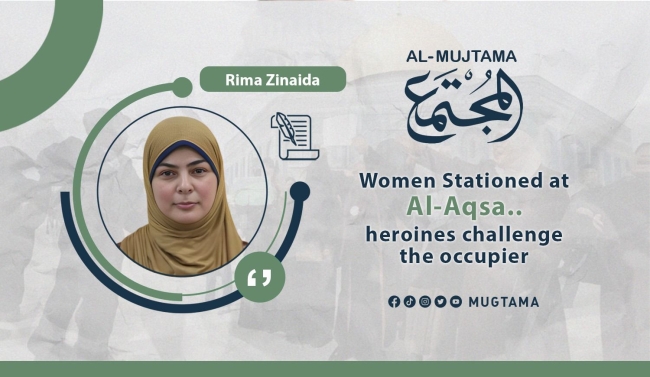Women Stationed at Al-Aqsa… heroines challenge the occupier Featured
On the sunrise of a new day, Hanadi al-Halwani, the Jerusalemite stationed, ties her hijab tightly, wearing the robes of her purity and chastity, accompanied by her bag on her back, on which the beauty of the features of the Dome of the Rock was imprinted.
Hanadi carries in her heart her Qur’an, which increases her certainty and increases steadfastness in the steps that she takes daily to the blessed Al-Aqsa Mosque, while she recites the Almighty’s saying: {Exalted is He who took His Servant by night from al-Masjid al-Haram to al-Masjid al-Aqsa, whose surroundings We have blessed, to show him of Our signs. Indeed, He is the Hearing, the Seeing.} (Al-Isra: 1).
And in this blessed spot, where the companions of her path, the “Al-Aqsa” flowers, stationed: Nafisa Khwais, Aida Al-Sidawi, Khadija Khwais, and many others, meet to recite and teach the Qur’an on the terraces of knowledge.
They raise their voices and shout "Allahu Akbar" in defense of Al-Aqsa Mosque in case of any attack by the occupation soldiers. They make every effort to confront the settlers' incursions, that may reach their climax for consecutive and repeated days, especially on occasions related to the alleged Jewish holidays.
Facing the danger of Judaization
Among the dangers that the stationed women are aware of are the repeated attempts by the occupation to Judaize the blessed Al-Aqsa Mosque, and the attempt to activate the temporal and spatial division scheme and make it a reality. This is what makes the stationed women remain in their place in confronting this dangerous project despite the assault on them with severe beatings, arrests, and heavy financial fines to spread terror in their hearts to dissuade them from their stationing.
The stationed women win these battles every time, despite the wounds, sores, and fainting caused by tear gas, black pepper spray, beatings, handcuffs, and arrests.
Praying at the gates of Al-Aqsa
This legendary steadfastness of stationed women made them among the targets of the occupation. Thus, the policy of arresting them and deporting them from Al-Aqsa Mosque became part of the punishments through which the occupation aims to empty Al-Aqsa of the stationed women, as they pose a threat to it.
Despite this, Hanadi and her stationed companions have devised a new method of stationing, which is to pray at the nearest gate to the mosque, which angers the enemy. They pray even in cold and rainy weather, as well as in the summer heat. All of this does not weaken their resolve, as they are like palm trees, their roots spreading in the land of Al-Aqsa, lofty and challenging the enemy with this stationing.
This made them more experienced in the plans of the occupation. They try as much as possible not to exceed the permissible place in deportation, to miss the opportunity for the occupation to impose heavy fines in the event of violating the deportation decision.
As soon as the term of the deportation decision comes to an end, the occupiers' attempt to put pressure on them is renewed. From time to time, their homes are stormed and turned upside down as part of the punishment policy.
Arrest and Shackling
This strength and the apparent steadfastness of the features of the stationed women made them subject to arrest by the occupation soldiers, and the most difficult thing for the stationed women was the occupation’s attempt to forcefully remove their headscarves while they were shackled. They are summoned before their captivity in prisons to the occupation courts, and in the summons, the female soldiers must be strip-searched to humiliate the dignity of the stationed women.
Marriage and Stationing
One of the beautiful pictures of stationing is that picture drawn by the stationing Bayan Al-Ja’bah, who planned to hold her marriage in the courtyards of Al-Aqsa Mosque, to be a witness to the building of a new family that gives birth to generation after generation that preserves its faith, protects its sanctity with its pure blood, and preserves its right despite the arrogance of the occupation.
The liberation «Maqlouba»
From time to time, Al-Aqsa witnesses a kind of innovative resistance. The female stationed Hanadi Al-Halawani, Khadija Khwais and other stationed females who used to sit on the Holy Land near the Al-Aqsa Mosque gate became famous for their “upside down rice dish” {Maqlouba} in front of the eyes of the occupation when they were prevented from entering Al-Aqsa. The beginning of the resistance was through the “Maqluba” at the Chain Gate - which is one of the gates of Al-Aqsa Mosque - when the occupation issued a decision to prevent Hanadi Al-Halawani from entering Al-Aqsa, and at that time she decided to station at its door with the stationed females in her own way.
The reason that made them prepare the “Maqlouba” is that there are narrations that when the commander Salah al-Din al-Ayyubi liberated the holy city of Jerusalem, the city witnessed a celebration of this victory by preparing this dish. Salah El-Din said, what is the name of this “Maqlouba” dish, given that after preparing it, it was flipped in the serving trays, and since that time it has been called “Maqlouba” food.
Leave a comment
Make sure you enter all the required information, indicated by an asterisk (*). HTML code is not allowed.



